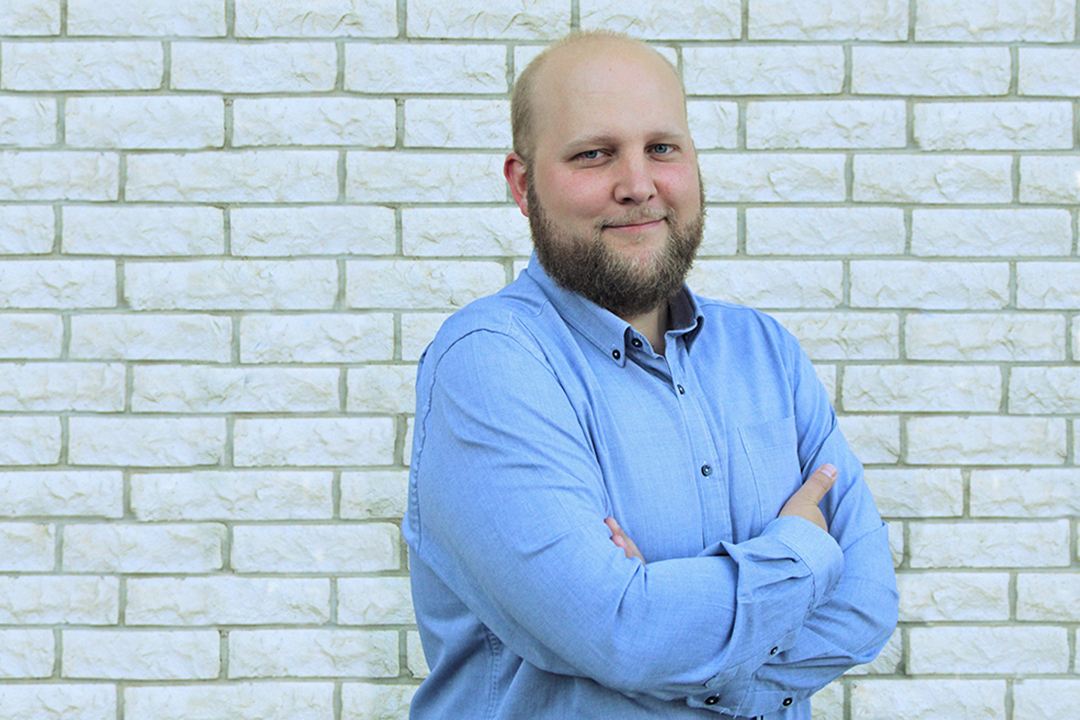
Velez broadens research through postdoctoral fellowship
University of Saskatchewan researcher Dr. Emilio Velez has received a prestigious postdoctoral fellowship through the Canadian Institutes of Health Research (CIHR).
By Katie Brickman-Young“It was a huge surprise. The chances of getting one of these fellowships are very low due to the extremely high competition,” says Velez, a postdoctoral fellow in the Department of Veterinary Biomedical Sciences at the Western College of Veterinary Medicine (WCVM). “I am happy and proud of this [achievement]. It is an important recognition.”
The federal funding agency only distributed 92 CIHR fellowships this year. The program provides support for highly-qualified candidates at the postdoctoral (post-PhD) or post-health professional degree stages to add to their experience by engaging in health research in Canada or abroad. The CIHR fellowship will provide Velez with a $45,000 stipend and a $5,000 research allowance over the coming year.
Velez came to USask in 2018 through a postdoctoral fellowship from the Saskatchewan Health Research Foundation (SHRF) and joined WCVM professor Dr. Suraj Unniappan’s research lab whose members focus on aspects of integrative neuroendocrinology.
Velez received his Bachelor of Science (biology) and Master of Science (integrative physiology) degrees from the University of Barcelona in Spain. His doctoral studies focused on the endocrine regulation of fish growth.
The endocrine system is a collection of hormone-producing glands that regulate metabolism, growth and development, tissue function, sexual function, reproduction, sleep and mood. Both the endocrine system and nervous systems act jointly to control and regulate different body functions and processes.
After acquiring his PhD degree from the University of Barcelona, Velez wanted to continue broadening his knowledge in other research fields and moved to biomedical research.
“My PhD thesis focused on studying the endocrine and metabolic regulation of growth and muscle development in fish,” says Velez. “The growth hormone (GH) and insulin-like growth factors (IGF) axis acts as a primary regulator of growth and is an important metabolism modulator and that was extremely interesting to me.”
His passion for researching endocrinology and metabolism is because of the important roles that growth hormone (GH) and insulin-like growth factors (IGF) axis have in human health and disease.
“Acromegaly (hormone disorder), growth retardation and GH deficiency syndrome are some main diseases associated with disturbances in growth hormone availability and/or action,” explains Velez. “GH imbalances have also been linked with obesity and weakness in the heart, muscle and bone, with an increased risk of heart diseases, reduced exercise capacity, and impaired quality of life.
“Expanding our knowledge on the regulation of growth hormones and the discovery of new modulators, all could contribute to the future improvement of health and well-being of animals.”
The main goal of Velez’s focus through this CIHR fellowship is to determine whether two recently identified bioactive peptides — nesfatin-1 and nesfatin-1-like peptide — are involved in the regulation of growth in mammals.
Nesfatin-1 is a neuropeptide (small protein-like molecules) produced in mammals’ hypothalamus — an integral part of the brain. Nesfatin-1 participates in the regulation of hunger and fat storage. Increased nesfatin-1 in the hypothalamus contributes to diminished hunger and a potential loss of body fat and weight.
“Preliminary data suggests these peptides have growth regulatory effects in fish, so we hypothesized that a similar function could be exercised in mammals,” says Velez.
In the first part of the SHRF-funded project, results have demonstrated that nesfatin-1 and nesfatin-1-like peptide are critical in regulating growth hormone synthesis and secretion.
“[In] the second part, which is CIHR funded, we aim to determine how important the naturally occurring forms of these peptides are in the maintenance of both growth and metabolism,” says Velez. “This will be achieved using animal models and genetic approaches.”
Since Velez has completed almost two years of his postdoctoral fellowship with SHRF funding, the CIHR fellowship will last up to March 2021. On top of the federal funding, Velez is receiving a $10,000 salary “top-up” award from SHRF.
“I believe the new experiments planned in this project will help expand our knowledge on new regulators of growth,” he says. “I hope this investigation can ultimately be useful for improving the health of both domestic animals and humans.”
This is the fourth CIHR fellowship and 12th external fellowship secured by Unniappan’s research lab. These positions have brought in over $1.2 million to Unniappan’s Laboratory of Integrative Neuroendocrinology.
“Dr. Velez is a talented and smart individual. This is a great project and it should be followed through with, so getting this fellowship will allow him to continue that research,” says Unniappan, Velez’s supervisor. “This also gives a great endorsement with the WCVM and our lab for the research we are doing.”
